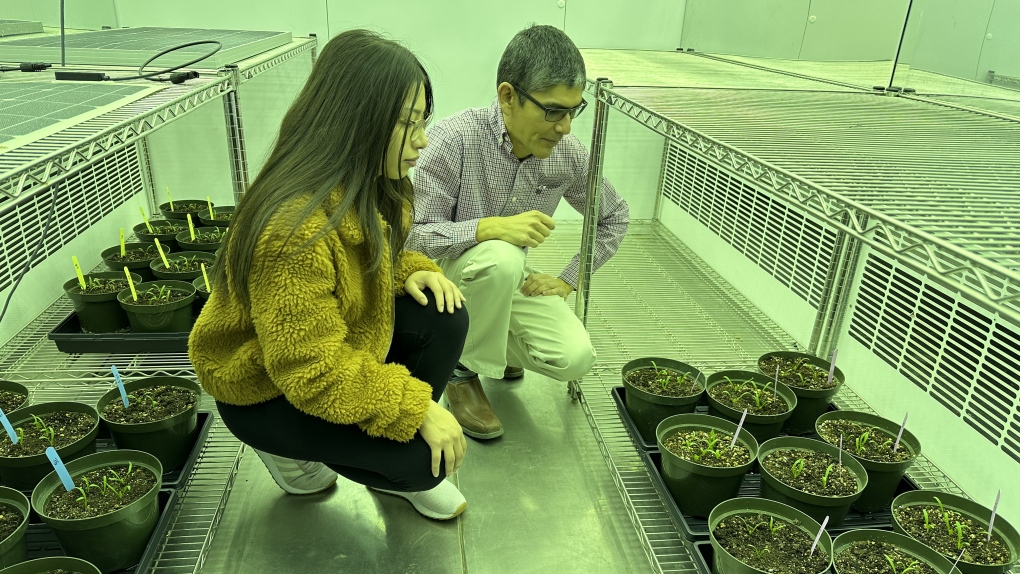'More connected': Researchers looking at growing food under solar panels
 Guillermo Hernandez, right, a soil scientist, and Camila Quiroz, a research intern from Peru, and look over their plants in a research room at the University of Alberta in Edmonton in this undated handout photo. (Guillermo Hernandez, University of Alberta
Guillermo Hernandez, right, a soil scientist, and Camila Quiroz, a research intern from Peru, and look over their plants in a research room at the University of Alberta in Edmonton in this undated handout photo. (Guillermo Hernandez, University of Alberta
Lawns, backyards and roofs could be used to produce both solar power and fresh vegetables, University of Alberta researchers say.
Guillermo Hernandez, a soil scientist, and Camila Quiroz, a research intern from Peru, are looking into growing crops under solar panels to improve the use of space in cities and farms.
"We know how to generate electricity from sunlight. We also know how to grow crops," says Hernandez. "But the question is, can we do the two things in the same space?"
Crop harvesting under solar panels is called agrivoltaics, a relatively new concept to improve land-use efficiency by producing energy and food in the same spot.
In a 25-day experiment, Hernandez and Quiroz grew batches of spinach under three systems — thick solar panels, thin solar panels and without solar panels.
The researchers used simulated sunlight in a small room at the university during the Alberta winter.
Quiroz, who is studying energy engineering in Peru, says there weren't any significant differences in taste or nutrition between the spinach grown under solar panels and the batch grown under simulated sunlight.
"I ate some of the solar panel-grown spinach," Quiroz says. "They were sweet. The taste was perfect."
However, the solar panel-grown plants were smaller than the batch grown without the panels.
Quiroz says a "little more time" under the panel would help them mature better.
The researchers are conducting a lab analysis to determine the exact nutritional composition of the three batches, and will be publishing the results in the coming weeks.
Quiroz says agrivoltaics is about more than just optimizing land area.
Solar panels create a microclimate underneath them, shielding plants from direct sunlight and fostering the right temperatures. Greens, berries and broccoli are among the foods that grow well under solar panels.
Quiroz says solar panels could also contribute to higher crop production for certain foods and improve water efficiency.
"Another benefit is the increase the solar energy generation," Quiroz says.
An International Energy Agency report this year said investors are increasingly gravitating towards solar-powered projects, outpacing the spending on fossil fuel projects for the first time.
Hernandez says even though the initial cost of installing solar panels could be high, agrivoltaics has the potential to become a part of the urban landscape in Canada.
"The connection with food is missing in some urban areas."
He says agrivoltaic farming would teach people to grow fresh produce while harnessing solar energy on balconies, backyards and smaller areas.
"People will be able to witness growing their own food, and they will feel more connected to where their food is coming from."
Some provincial governments have been giving rebates and grants to households and institutions for installing solar panels.
Other countries, including South Korea and France, are also experimenting with agrivoltaics.
Hernandez says the next step is to secure funding for research on other vegetables and explore how solar panels work outdoors and at differing heights and angles.
He is also working on a guide for agrivoltaic farming, which would include a list of crops that can be grown under solar panels.
This report by The Canadian Press was first published May 27, 2023
CTVNews.ca Top Stories

'Still so much love between us,' Sophie Gregoire Trudeau says of Prime Minister Justin Trudeau
Sophie Gregoire Trudeau says there is 'still so much love' between her and Prime Minister Justin Trudeau, as they navigate their post-separation relationship co-parenting their three children.
What to know about avian influenza in dairy cows and the risk to humans
Why is H5N1, or bird flu, a concern, how does it spread, and is there a vaccine? Here are the answers to some frequently asked questions about avian influenza.
'I was scared': Ontario man's car repossessed after missing two repair loan payments
An Ontario man who took out a loan to pay for auto repairs said his car was repossessed after he missed two payments.
opinion The special relationship between King Charles and the Princess of Wales
Royal commentator Afua Hagan writes that when King Charles recently admitted Catherine to the Order of the Companions of Honour, it not only made history, but it reinforced the strong bond between the King and his beloved daughter-in-law.
Pro-plastic lobbyist presence at UN talks is 'troubling,' say advocates
Environmentalist groups are sounding the alarm about a steep increase in the number of pro-plastic lobbyists at the UN pollution talks taking place this week.
'Too young to have breast cancer': Rates among young Canadian women rising
Breast cancer rates are rising in Canada among women in their 20s, 30s and 40s, according to research by the University of Ottawa (uOttawa).
Charlie Woods, son of Tiger, shoots 81 in U.S. Open qualifier
Charlie Woods failed to advance in a U.S. Open local qualifying event Thursday, shooting a 9-over 81 at Legacy Golf & Tennis Club.
$70M Lotto Max winners kept prize a secret from family for 2 months
During a special winner celebration near their hometown, Doug and Enid shared the story of how they discovered they were holding a Lotto Max ticket worth $70 million and how they kept this huge secret for so long.
Courteney Cox says her partner Johnny McDaid once broke up with her in therapy
Courteney Cox's longtime partner Johnny McDaid once broke up with her in a therapy session.





























